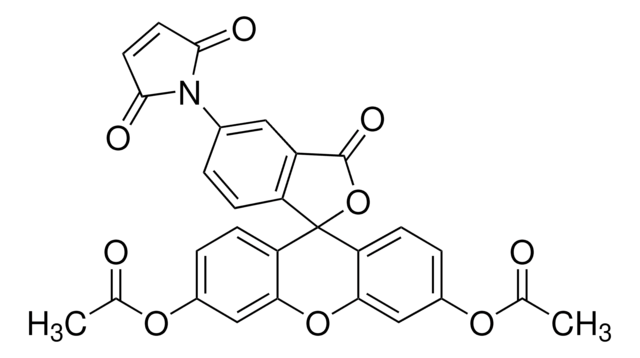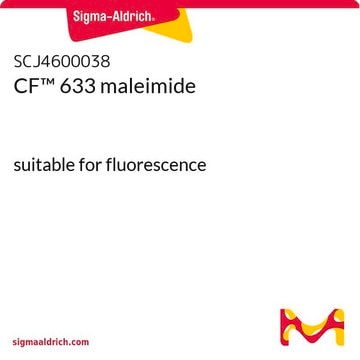94506
Tetramethylrhodamine-5-maleimide
suitable for fluorescence, ≥85% (HPLC)
About This Item
Recommended Products
Assay
≥85% (HPLC)
form
powder
solubility
DMSO: soluble
methanol: soluble
fluorescence
λex 543 nm; λem 575 nm in 0.1 M phosphate pH 7.0
suitability
suitable for fluorescence
storage temp.
−20°C
InChI
1S/C28H25N3O5/c1-29(2)16-5-9-20-23(14-16)36-24-15-17(30(3)4)6-10-21(24)27(20)19-8-7-18(13-22(19)28(34)35)31-25(32)11-12-26(31)33/h5-9,11-15H,10H2,1-4H3,(H,34,35)
InChI key
KGFLZYXDJDOIEE-UHFFFAOYSA-N
Related Categories
Application
- to concentrate the eluate and in labeling to create IRE1LDS112C
- to derivatize green fluorescent protein (GFP) on Cys48 for experiments with the extrinsic fluorescent probe
- to incubate the single solvent exposed cys mutant to perform protein labeling
Packaging
Other Notes
Storage Class Code
11 - Combustible Solids
WGK
WGK 3
Flash Point(F)
Not applicable
Flash Point(C)
Not applicable
Personal Protective Equipment
Certificates of Analysis (COA)
Search for Certificates of Analysis (COA) by entering the products Lot/Batch Number. Lot and Batch Numbers can be found on a product’s label following the words ‘Lot’ or ‘Batch’.
Already Own This Product?
Find documentation for the products that you have recently purchased in the Document Library.
Customers Also Viewed
Our team of scientists has experience in all areas of research including Life Science, Material Science, Chemical Synthesis, Chromatography, Analytical and many others.
Contact Technical Service








